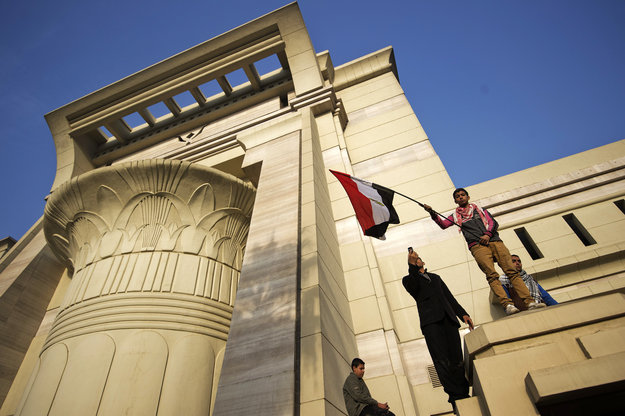
(AFP Photo)
Thirteen local rights groups condemned the authorities’ forced retirement of 41 judges which occurred earlier this month.
In a joint statement Wednesday, the groups said they believe “the real reason for the retirements is not the judges’ involvement in politics…but rather for opinions they expressed in opposition to the current governing administration”.
On 14 March, the Cairo Appeals Court forced 41 Egyptian judges into retirement for allegedly supporting former president Mohamed Morsi and the Muslim Brotherhood.
The judges had released a statement on 6 July 2013 expressing their stance on the 30 June protests and the 3 July military ouster of Morsi.
Members of the Judges Club filed a complaint to the public prosecutor claiming that 75 judges had signed a statement that contained several “lies” and “accused the Egyptian army of breaching electoral legitimacy”.
The complaint was referred to the Supreme Judiciary Council, then to the Minister of Justice for the appointment of an investigative judge from the Cairo Court of Appeals.
The rights groups’ joint statement said: “The judges who signed the statement emphasised that their sole allegiance was to legitimacy, truth, and justice. They said they rejected the assault on electoral legitimacy and the exclusion of deposed President Morsi.”
Fifteen judges were then referred to a disciplinary trial in the ‘judges for Egypt case’, while another 56 were referred to a disciplinary trial in a ‘statement in support case’.
The 15 judges charged with belonging to the group “Judges for Egypt” had read out a statement at the Rabaa Al-Adaweya sit-in, arguing that “what happened on 3 July [2013] is a military coup and we demand that the Egyptian people support the constitutional legitimacy”.
Local Egyptian rights groups say there is a “lack of specific standards for acts that require disciplinary sanctions for judges or the loss of a judgeship”. They also argue that the judiciary law gives the disciplinary board the “absolute authority” in such cases.
Huda Nasrallah, from the Egyptian Initiative for Personal Rights (EIPR), said the group signed the statement because there is a “crisis from early on amongst judges who oppose the ruling regimes”.
What the state does with judges “is similar to what it does with its normal supporter opposition”, Nasrallah said.
“For example, if there is a protest opposing the regime, the protesters will be charged with violating the protest law, causing chaos and so on, however if there is a protest in support of the regime, there will be no problem and at all and the state will welcome it,” she said.
Nasrallah added that this is what happened with the judges, it was acceptable for some judges to appear on television stating they support the 30 June protests and the military ouster of Morsi while those that opposed were charged with “mixing political matters with their work.”
Nasrallah also said there are two types of punishments for judges. They can either be forced into retirement, or they can be transferred to an administrative position. While the retirement age for judges is 70 years of age, retirement for administrative positions is at the age of 60 – as most of the judges are over 60 years, they are forced to retire anyway.
The signatories of the statement included: the Cairo Institute for Human Rights Studies; the Arab Network for Human Rights Information; the Egyptian Initiative for Personal Rights; El-Nadeem Centre for the rehabilitation of victims of violence and torture; the Egyptian Commission for rights and freedoms; Association for Freedom of Thought and Expression; and the Hisham Mubarak Law Center.
According to the organisations, the forced retirement of 41 judges infringes on the UN-endorsed Basic Principles on the Independence of the Judiciary. This states in part that “members of the judiciary are like other citizens entitled to freedom of expression, belief, association and assembly”.
They added that judges’ public participation and expression of opinion is “not new” as many judges had taken part in the 25 January Revolution.
They also said the judges “have even expressed political opinions on cases pending before them while sitting on the bench, a breach of all judicial norms around the world, but they have not been subject to disciplinary action, lost their judgeships, or been held accountable in these cases”.


